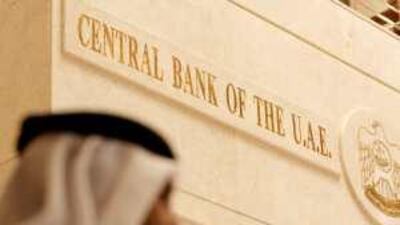The banking sector needs a further injection of liquidity to combat a decline in deposits and help revive lending as banks emerge from a quarter in which their earnings fell by more than 25 per cent, bankers and economists say. With banks facing a shortage of deposits and rising delinquencies, lending has been sluggish, exacerbating the economic slowdown in the country.
The UAE has already taken steps to boost liquidity by guaranteeing banking deposits and arranging to pump Dh120 billion ($32.69bn) into the financial system. But analysts say the Central Bank may need to adopt more unconventional measures of the kinds being used in the US and Europe, including so-called quantitative easing, or the creation of money. "There are various quantitative easing tools at the disposal of the Central Bank, such as lending cheap money, buying into securities or making direct liquidity injections, as the regulator did earlier," said Ali Khan, the managing director at Arqaam Capital in Dubai. "Quantitative easing tools are necessary in the current situation where banks' loan-to-deposit ratio is over the set limit of the Central Bank or close to that," Mr Khan said.
Michael Tomalin, the chief executive of the National Bank of Abu Dhabi, said the Central Bank could adopt a similar approach to other countries' financial regulators. Mr Tomalin told Bloomberg yesterday: "There has to be either some quantitative easing by the Central Bank, broadly speaking," by buying in securities from banks and giving them money "or some easing in the ratios. Because banks are tight for liquidity, there is quite a bidding war for deposits."
The latest recommendations from bankers and analysts add to a widening debate over the availability of cash, or liquidity, in the national economy. While the Central Bank has pointed to its own efforts to pump cash into banks, as well as falling interbank lending rates, as evidence that liquidity is ample, bankers and business executives say that lending remains tight as banks try to beef up deposits to compensate for the rapid exit of foreign funds from the UAE last year at the height of the global crisis. Some banks still have more loans outstanding than deposits, in violation of Central Bank rules.
"Banks are by definition constrained in their ability to lend," said Philippe Dauba-Pantanacce, a senior economist, at Standard Chartered Bank in Dubai. "For the banks to start to lend again, they would need to see a substantial increase on their deposit side, which is something that could be solved by the Central Bank by injecting money." Banks have been reluctant to lower rates and risk losing customer deposits while they remain under pressure to meet strict capital adequacy targets set by the Central Bank. Bank deposits in the Emirates fell 1.1 per cent in June.
Quantitative easing refers to the practice of a central bank buying the bonds of its own government. The Bank of England, for example, said yesterday it would extend its own programme to buy government bonds, first launched in March, raising the purchase to £175bn (Dh1.09 trillion) from £125bn. The US Federal Reserve has taken similar measures. By taking government debt on to their balance sheets, central banks help keep interest rates low and inject money into the economy.
The UAE Central Bank said on Tuesday it had met a select group of local and international lenders who support the idea of setting up a new calculation system for the Emirates interbank offered rate (Eibor) which better reflected actual market conditions. Eibor has fallen since the announcement but is still far higher than other local and international benchmarks such as the London interbank offered rate (Libor) and the Saudi Arabia interbank offered rate (Saibor).
The UAE's three-month interbank offered rate fell to 2.39 per cent yesterday from 2.43 per cent on Wednesday, while the six-month rate dropped to 2.70 per cent from 2.77 per cent. The one-year rate was down to 2.93 per cent from 2.98 per cent a day earlier. But bankers say the rate that banks are charging each other is actually closer to 0.5 per cent. Eibor is being inflated, they say, by banks misreporting their rates in order to lure depositors. Rates on deposits and commercial loans are set relative to Eibor.
* With agencies skhan@thenational.ae BoE fund infusion, b9


